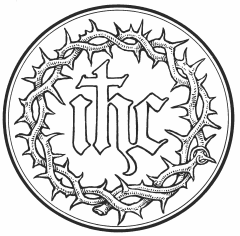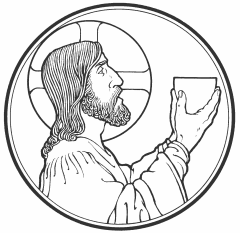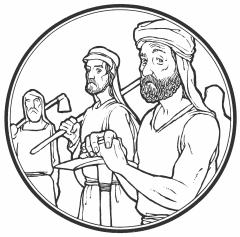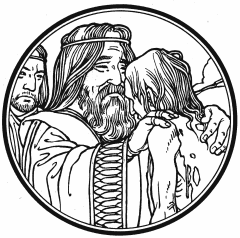Grace, mercy, and peace to you from God our Father, and from our Lord and Savior, Jesus Christ, amen. The text for the sermon is the Epistle, which was read earlier.
Today is a day filled with mixed emotions. The day begins with Jesus entering Jerusalem just before the Passover feast. St. John records, “The next day the large crowd that had come to the feast heard that Jesus was coming to Jerusalem. So they took branches of palm trees and went out to meet him, crying out, “Hosanna! Blessed is he who comes in the name of the Lord, even the King of Israel!”” The people seem earnestly happy that Jesus is coming and even praise Him as the King of Israel. Finally! After three years of non-stop preaching and teaching, of healing the sick and performing miracles, the people see Jesus for who He is: the King of Israel. But lest we get too excited, we need to figure out what kind of king the people think Jesus is.
The Messiah had been promised for a long time coming, in fact, He had been promised from the near beginning of time. This gave the people plenty of time to make themselves familiar with what the Old Testament Scriptures had to say about the coming Messiah. The Old Testament gave a good start for a description of who the Messiah would be yet it wasn’t complete, it wasn’t enough. There needed to be more. And so through the generations, the description of the Messiah was expanded until the people knew what the Messiah would look like at a single glance, that they would be able to identify Him with no sort of trouble or confusion.
At first glance, it sounds as if the people got it right. But John tells us, “The crowd that had been with him when he called Lazarus out of the tomb and raised him from the dead continued to bear witness. The reason why the crowd went to meet him was that they heard he had done this sign.” It seems as if this is a potential letdown. The people come to meet Jesus because He raised Lazarus from the dead. There were some in the crowd who acknowledged Him as the Messiah, but there were plenty who did not have that thinking.
The scribes and Pharisees saw nothing that screamed Messiah about Jesus. He was the Son of a lowly carpenter. He didn’t come from a great line of kings or leaders so it was impossible for Jesus to be a great king who would boot Roman rule from Jerusalem. For those reasons and more, Jesus was dismissed as being the Messiah. But there was more to Jesus than meets the eye.
As we look at our Epistle text this morning, Paul has an important message, a message that was not widely held then and unfortunately is not widely held today either. Paul encourages us to have the same mindset as Jesus, but he knows all too well the mindset of sinful human beings. We are full of selfish ambition and conceit, looking to our own self-interests rather than that of our neighbor. This attitude is nothing new, as it harkens back to our first parents in the Garden. It doesn’t fear, love, and trust in God above all things. It doesn’t love our neighbor as ourselves. Rather, it is all about us and what I get out of it.
While the selfish mindset is what comes natural to us, Paul tells us that we should have another mindset, that of Christ. Listen again to what St. Paul says: “Have this mind among yourselves, which is yours in Christ Jesus, who though he was in the form of God, did not count equality with God a thing to be grasped, but made himself nothing, taking the form of a servant being born in the likeness of men. And being found in human form, he humbled himself by becoming obedient to the point of death, even death on a cross.” We are not called to be selfish, but to model our lives as Christ did and serve our neighbor. But our service cannot compare to that service of Christ. He possessed all glory from eternity and yet He laid it aside for a single purpose – to save us.
If you want to see just how much Christ love sinners, one only need to look at the manner in which He died. He humbled Himself to death on a cross. You might wonder the significance of that manner of death, but it is significant. Death on a cross was reserved for criminals, as we see the two criminals who were crucified with Jesus. Death on a cross was reserved for the guilty and yet Christ was innocent of all charges made against Him.
Today as we celebrate Palm Sunday, we also celebrate Passion Sunday, as we see in our Gospel reading. We go from the people celebrating and welcoming Jesus into Jerusalem to the people mocking and despising Jesus. And throughout all of this, what is that our Lord does in return? He remains silent. He takes the mocking and despising. He takes the beating and scourging. He willingly goes to the cross. He dies. The very direction in which His whole life went was toward emptying Himself. He emptied Himself finally of His very life. And yet says Paul, in the very mystery of that life, in the self-giving of the Son of God in the flesh, on the cross, God has turned the whole universe around. He has opened up for man a new way to live.
When He prays in the Garden, He prays for you. He is your High Priest, preparing to offer Himself as the Sacrifice for sin. He doesn’t want that cup of suffering; but for you He prays to His Father, “Not My will, but Thy will be done.” Even today, exalted by His Father, what does He do? He prays for you, intercedes for you: “Father, these are your redeemed, and I have bought them with My blood. Hear their prayers and save them.”
When Jesus stands silently before the High Priest and, later, Pilate, He silently accepts all the accusations and the blame in service to you. The accusations are false, of course: the sins are not His. But the sins are yours: and so He takes them. He takes the blame and does not defend Himself, because He’s taking all of your sins to the cross—to serve you. And so the Son thus declares, “No, Father, do not judge these people for their sins. Judge Me for them instead.”
And that is what the cross is about. In service to you, the Savior suffers far more than physical torment and death. He suffers His Father’s judgment for your sins and for the sins of the world. He suffers hell there for you. “Greater love has no man than this, than to lay down His life for His friends,” He once told His disciples, and there is no greater love or service than His cross in your place. Do not miss, by the way, that the Father is serving you at the cross, too: for rather than judge you for your sin, He gives His Son in your place, for you.
That is your Savior—the Son of God who makes Himself of no reputation and becomes obedient to death on the cross for you. By His death, you have life. By His grace, you are now set free to serve others—you are set free from sin to serve as God created you to.
You have the mind of Christ, because Christ joins Himself to you. He speaks His Word of grace, renewing your Baptism and declaring you remain His child. He gives you His body and blood, and so He is with you always. He is with you always to serve. And solely by His service to you, you are sure that you are forgiven for all of your sins. In Jesus’ name, amen. Now the peace of God that passes all understanding, keep your hearts and minds through faith in Christ Jesus, amen.




